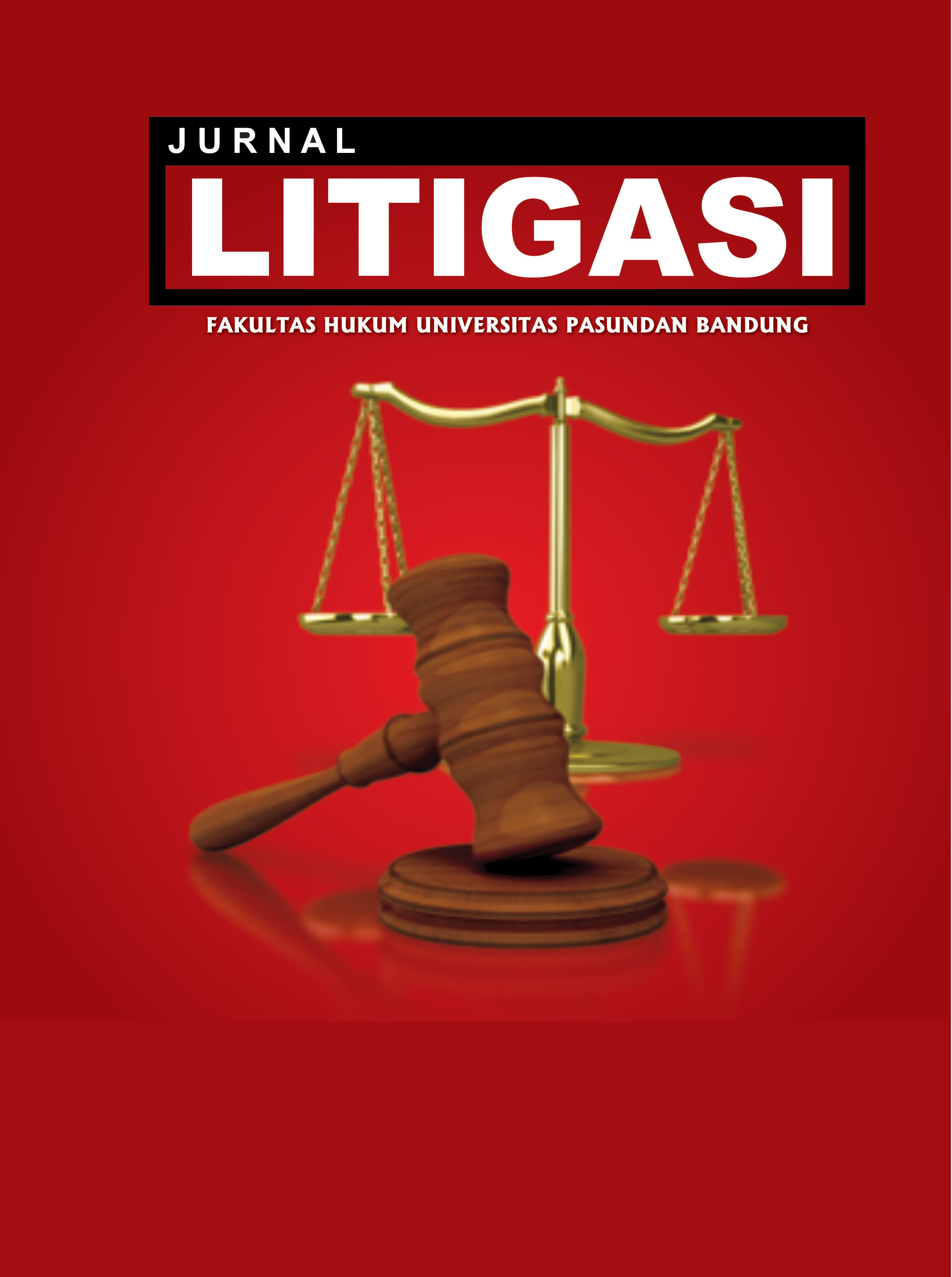UNDANG-UNDANG CIPTA KERJA DI TENGAH HIMPITAN PUTUSAN MAHKAMAH KONSTITUSI NOMOR 91/PUU-XVIII/2020
DOI:
https://doi.org/10.23969/litigasi.v23i1.4773Abstract
The Job Creation Act is believed to be able to end the obesity of statutory regulations in Indonesia which often creates disharmony between laws and regulations which results in sectoral ego and bureaucracy in providing government services to the people, both in the form of permit and non-permit. The spirit of the Job Creation Act in the context of regulatory simplification is expected to accelerate national economic recovery in the midst of a pandemic and to cut bureaucracy in services for investment and MSMEs. However, along the way, the Constitutional Court Decision No. 91/PUU-XVIII/2020 has stated that Law No. 11 of 2020 concerning Job Creation does not have conditionally binding legal force as long as it is not interpreted as "no amendment are made within 2 (two) years, even if it cannot be resolved, it becomes permanently unconstitutional and the amended and revoked law is declared to be reinstated. This research is a normative legal research or literature research (doctrinal research), which uses primary and secondary legal materials. These two materials are used in order to obtain a comprehensive analysis and perspective on the legal issues discussed. This research was conducted in order to analyze the job creation law after the Constitutional Court's decision. The Job Creation Act is still in effect but cannot be implemented, therefore the government as the initiator must immediately assign the Minister of Law and Human Rights to revise the Job Creation Law as soon as possible so that the process of procedure and its formation with Law No. 12 of 2011, or amendment to Law No. 12 In 2011 by adding the omnibus method and the procedure for its formation.
Keywords: Conditional unconstitutional.
Downloads
References
Alrasid, H. (2003). Masalah Judicial Review. Rapat Dengar Pendapat Tentang “Judicial Review” Di Departemen Kehakiman Dan HAM, 2.
Amsari, F. (2011). Perubahan UUD 1945 Perubahan Konstitusi Negara Kesatuan Republik Indonesia Melalui Keputusan Mahkamah Konstitusi. Rajawali Pers.
Asshidiqqie, J. (2005). Model-Model Pengujujian Konstitusional Berbabagai Negara. Konstitusi Press.
Asshidiqqie, J. (2010). Hukum Acara Pengujian Undang-Undang, Sinar Grafika. Sinar Grafika.
Dwi Kusumo Wardhani (2020), Disharmoni Antara Ruu Cipta Kerja Bab Pertanahan Dengan PrinsipPrinsip Uu Nomor 5 Tahun 1960 Tentang Peraturan Dasar Pokok-Pokok Agraria (Uupa), Jurnal Komunikasi Hukum (Jkh) Universitas Pendidikan Ganesha ,Vol. 6 No. 2, hal. 440.
Faqih, M. (2010). Nilai-nilai Filosofi Putusan Mahkamah Konstitusi yang Final dan Mengikat. Jurnal Konstitusi, 7(3), 97.
Freaddy, F. (2017). Konseptualisasi Omnibus Law dalam Menyelesaikan Permasalahan Regulasi Pertanahan. ARENA HUKUM, 10(2), 242.
Fuady, M. (2009). Teori Negara Hukum Modern. Aditama.
Garner, B. A. (2014). Black’s Law Dictionary. West Publishing Co.
Isra, S. (2014). Peran Mahkamah Konstitusi dalam Penguatan Hak Asasi Manusia Di Indonesia. Jurnal Konstitusi, 11(3), 421.
Komnas HAM. (2020).
Mahkamah Konstitusi. (2009). Putusan MK Nomor Nomor 27/PUU-VII/2009.
Marzuki, P. M. (2008). Penelitian Hukum. Kencana Prenada Media Group.
Mochtar, Z. A. (2015). Antinomi dalam Peraturan Perundang-undangan di Indonesia. Hasanuddin Law Review, 1(3), 317.
Palguna, I Dewa G. (2010). Constitutional Question: Latar Belakang dan Praktik Di Negara Lain Serta Kemungkinan Penerapannya Di Indonesia. Jurnal Hukum Ius Quia Iustum, 17(1), 3.
Palguna, I Dewa Gede. (2013). Pengaduan Konstitusional: Upaya Hukum Terhadap Pelanggaran Hak-Hak Warga Negara. Sinar Grafika.
Palguna, I Dewa Gede. (2018). Mahkamah Konstitusi: Dasar Pemikiran, Kewenangan, dan Perbandingan Dengan Negara Lain. Konstitusi Press.
Raharjo, S. (1981). Hukum Masyarakat & Pengembangunan. Alumni.
Redi, A. (2020). Omnibus Law : Metode Sakti Mengatasi Kebuntuan Praktik Berhukum dalam buku yang disusunnya bersama Ibnu Sina Chandranegara, Omnibus Law Diskursus Pengadopsiannya Ke Dalam Sistem Perundang-Undangan Nasional. Rajawali Pers.
Ketetapan MPR RI No. IX/MPR/2000. Tentang Penugasan Badan Pekerja MPR untuk mempersiapakn Perubahan UUD 1945., IX/MPR/2000 (2000) (testimony of Majelis Permusyawaratan Rakyat RI).
Rishan, I. (2021). Konsep Pengujian Formil Undang-Undang di Mahkamah Konstitusi. Jurnal Konstitusi, 18(1), 1–21.
Soekanto, S., & Mahmudji, S. (2001). Penelitian Hukum Normatif Suatu Tinjauan Singkat. Radja Grafindo Persada.
Soeroso, F. L. (2013). Pembangkangan Terhadap Putusan Mahkamah Konstitusi. Jurnal Yudisial, 6(3), 228.
Suhartono, & Estiko, D. H. (2003). Mahkamah Konstitusi : Lembaga Negara Baru Pengawal Konstitusi (P. S. J. D. RI (Ed.)). Agarino Abadi.
Downloads
Submitted
Accepted
Published
How to Cite
Issue
Section
License
Copyright (c) 2022 JURNAL LITIGASI (e-Journal)

This work is licensed under a Creative Commons Attribution 4.0 International License.
Copyright © 2026 Jurnal LITIGASI (e-Journal).
Jurnal LITIGASI (e-Journal) adopts the CC-BY license as the optimal license for publishing, distributing, using, and reusing scholarly work. Authors who publish with this journal retain copyright and grant the journal right of first publication with the work simultaneously licensed under a Creative Commons Attribution 4.0 International License (CC-BY 4.0). This license allows others to share, copy, distribute, and adapt the work, provided that the work's authorship and initial publication in this journal are properly cited.






























